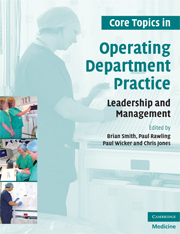Book contents
- Frontmatter
- Contents
- List of contributors
- Foreword
- Preface
- 1 Managing change in perioperative education
- 2 The role of the operating department manager within the context of the organization
- 3 Action learning: a new way of problem solving in perioperative settings
- 4 Agenda for change: what do theatre staff need to know?
- 5 The SWOT analysis: its place in strategic planning in a modern operating department
- 6 Corporate governance: setting the scene for perioperative practice
- 7 Managing different cultures: adversity and diversity in the perioperative environment
- 8 Leadership in perioperative settings: a practical guide
- 9 Management and leadership of advanced practice
- 10 Managing conflict in perioperative settings
- 11 The management and organization of emergency operating lists
- 12 Organizational culture
- 13 Development matters in the NHS; including a perioperative approach to the KSF
- 14 Equipment procurement: a purchaser's guide for theatre managers
- 15 The reflective practitioner in perioperative settings
- 16 New ways of working in perioperative practice
- 17 Damned if you do and damned if you don't: whistle blowing in perioperative practice
- 18 A manager's experience of recruitment and retention
- 19 The management of change
- Index
- References
15 - The reflective practitioner in perioperative settings
- Frontmatter
- Contents
- List of contributors
- Foreword
- Preface
- 1 Managing change in perioperative education
- 2 The role of the operating department manager within the context of the organization
- 3 Action learning: a new way of problem solving in perioperative settings
- 4 Agenda for change: what do theatre staff need to know?
- 5 The SWOT analysis: its place in strategic planning in a modern operating department
- 6 Corporate governance: setting the scene for perioperative practice
- 7 Managing different cultures: adversity and diversity in the perioperative environment
- 8 Leadership in perioperative settings: a practical guide
- 9 Management and leadership of advanced practice
- 10 Managing conflict in perioperative settings
- 11 The management and organization of emergency operating lists
- 12 Organizational culture
- 13 Development matters in the NHS; including a perioperative approach to the KSF
- 14 Equipment procurement: a purchaser's guide for theatre managers
- 15 The reflective practitioner in perioperative settings
- 16 New ways of working in perioperative practice
- 17 Damned if you do and damned if you don't: whistle blowing in perioperative practice
- 18 A manager's experience of recruitment and retention
- 19 The management of change
- Index
- References
Summary
Key Learning Points
Understand the concept of reflective practice
Explore the role of reflection in practice
Use critical incident analysis as a basis for reflection
Introduction
In recent years, healthcare provision has changed significantly. It is with a degree of certainty that we can assume change will continue, as society undergoes progress and transformation. The rapid transformation has, and will continue to have, a direct impact on the role and function of all healthcare practitioners. Evolutionary history teaches that all organisms must adapt with their environment or die, and that organisms developing a feature that helps them to succeed in their environment prosper at the expense of those who do not (Handy 1989).
The changing environment in healthcare follows national direction as set out in the current government's policies. These were first outlined in the White Paper The New NHS: Modern, Dependable (Department of Health 1997), followed by the strategic framework presented in The NHS Plan (Department of Health 2000). These policies presented the vision for the NHS in the twenty-first century. More recently, further challenges in the reform journey within the NHS are presented in High Quality Care for All: NHS Next Stage Review Final Report (Department of Health 2008).
- Type
- Chapter
- Information
- Core Topics in Operating Department PracticeLeadership and Management, pp. 129 - 133Publisher: Cambridge University PressPrint publication year: 2009

